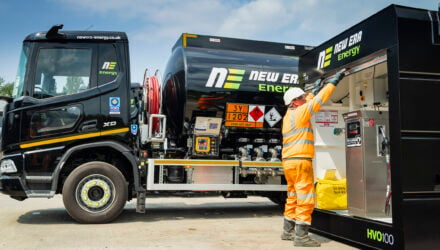
Paul Hollick, ICFM chairman
Paul Hollick, ICFM (Institute Of Car Fleet Management) chairman: “On behalf of all fleet decision-makers and company car drivers, the ICFM is hugely disappointed that Chancellor of the Exchequer Philip Hammond did not use the Spring Statement to bring clarity to company car benefit-in-kind tax from April 2020 and beyond.
“Promising to publish details ‘in the coming months’ on what is a fundamental issue for all fleets merely continues the uncertainty that is crippling decision-making.
“It is clear that the Chancellor, ministers and HM Treasury, has become completely blindsided by Brexit and seem incapable of making decisions on many issues, including future company car benefit-in-kind tax rates.
“In terms of overall taxation, company car benefit-in-kind tax may only be a relatively small issue. However, almost one million employees pay benefit-in-kind tax on company cars, according to HM Revenue and Customs’ figures, and sales of cars to fleets are critical for motor manufacturers.
“The fleet industry, indeed the entire motor industry, cannot afford for the Government to continue to drag its feet on an issue – WLTP-based taxation – the introduction of which it has known about for years and should have been planning for.
“The Government continues to preach about requirements to improve air quality and reduce transport emissions, and fleet decision-makers acknowledge that businesses have a crucial role to play in decarbonising.
“However, all the good work that fleets have done in recent years in that area is unravelling because the Government cannot tell the industry what company car benefit-in-kind tax rates based on WLTP-produced emission figures will be from April 2020.
“Government in-decision is delaying the acquisition by fleets of new cars featuring the very latest emission-busting engine technology and, in some cases, driving employees out of company cars and into privately-funded older and more polluting vehicles.”

Ashley Barnett, Head of Consultancy at Lex Autolease
Ashley Barnett, Head of Consultancy at Lex Autolease:
WLTP “As we move from New European Driving Cycle (NEDC) values to NEDC-derived and ultimately to the exclusive use of WLTP, vehicles’ fuel consumption and emissions values are effectively increasing, which has tax implications for businesses and individual drivers. We look forward to reading the government’s response to the outcomes of the WLTP consultation, and hope that the need to manage the impact of WLTP on Vehicle Excise Duty (VED) and company car tax will be recognised.
“Without guidance on how WLTP will affect company car tax rates, we run the risk of contract holders deciding not to renew, and more people opting out of their company car schemes in favour of a less-regulated grey fleet environment. Fleets have a critical role to play in pioneering the newest, cleanest vehicle technology, so it’s important that the knock-on effects of the WLTP transition don’t make company vehicles seem like a less attractive option.”
Absence of company car tax bands post 2020/21“The lack of long-term company car tax tables is holding the fleet market back – we had hoped for an update from the Chancellor today. Before fleet decision makers can build a strategy based around the average 48-month contract, and before employees can commit to what is essentially a four-year investment, they need assurance that the associated costs are not going to increase over its lifetime.
“We already know that orders for diesel vehicles are being delayed in case further tax increases are announced that could make them prohibitively expensive. Similarly, questions remain over the future tax treatment of electric vehicles, which makes it difficult to forecast the cost of transitioning to an ultra-low and zero emission fleet.”
UK’s Road to Zero journey
“We welcome the updates on the forthcoming Environment Bill and the government’s continued commitment to a low carbon future, but the role of low and zero emission vehicles was noticeably overlooked.
“It’s positive that grants are still available to reduce the upfront cost of eligible pure electric vehicles, more clarity is needed – in particular to help drivers understand what the managed exit from the grants will look like, and how it might affect them financially. The announcement of scrappage schemes to encourage adoption of cleaner cars and vans in London is also a step in the right direction, and we would like to see them extended to become national initiatives.
“To ensure that plug-in vehicles are appealing, practical and user-friendly for drivers, we also need to see progress when it comes to investment in charging infrastructure, taking it beyond private, destination and pathway charging and extending it to provide shared schemes for overnight, on-street use.”

Matthew Walters, head of consultancy LeasePlan UK
Matthew Walters, head of consultancy LeasePlan UK
On the economic forecasts: “This Spring Statement has been overshadowed by Brexit – and its economic forecasts must be considered in that context too. The uncertainty caused by Britain’s impending departure from the EU has already hit economic confidence, and that uncertainty is unlikely to stop any time soon. Today’s anaemic growth forecasts might have to be downgraded in future.
“However, the fleet industry is well-placed to overcome these economic challenges, just as we have overcome similar challenges in the past. Not only did we account for over half of all new car sales in 2018, but we are also leading the adoption of cleaner motoring technologies.”
On WLTP: “The new emission testing regime – also known as WLTP – is an important part of the shift to greener motoring. However, its staggered integration into the tax system has created a lot of confusion and concern for fleets and their drivers. The use of NEDC-correlated figures, until WLTP figures apply from April 2020 onwards, means that some motorists are facing unexpected tax hikes.
“Thankfully, with the review he announced at last year’s Autumn Budget, the Chancellor has shown that he is listening to the fleet industry’s concerns – although we don’t yet know how he is acting. In a Written Ministerial Statement (WMS) published alongside today’s Spring Statement, Philip Hammond confirmed that the review’s conclusions will be revealed in the coming months.
“It seems as though the Chancellor – like the Government – has been distracted by Brexit and has had to postpone some of his announcements. Indeed, the WMS feels like a list of things the Chancellor would have rather been focussing on had the spectre of Brexit not been looming large. That said, fleets and drivers need confirmation of how the WLTP regime will be dealt with in regards to vehicle and company car taxation as well as capital allowances. We urge Hammond to stick to the commitment he has set out today even though ‘over the coming months’ is a little vague.
On Company Car Tax: “Philip Hammond would probably say that the Spring Statement is not a time for big announcements. However, there is one big announcement that he should have made today but didn’t: the rates of Company Car Tax for 2021-22 and 2022-23. It’s outrageous that we weren’t told these rates years ago, and yet we’re still waiting. This means that fleets and motorists cannot properly prepare for the years ahead, which is particularly worrying at a time of such economic uncertainty. The Chancellor needs to reveal the rates as soon as possible – preferably even ahead of this summer’s draft Finance Bill.”







